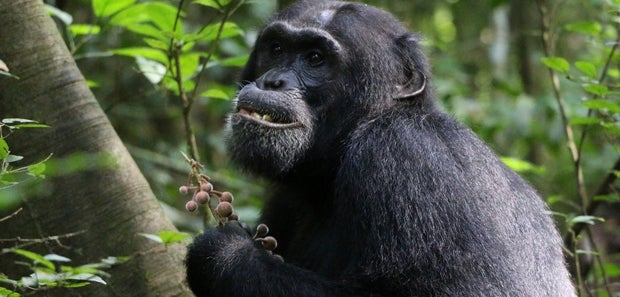London — Chimpanzees in the wild use medicinal plants to treat their injuries or illnesses, according to a study from the University of Oxford that researchers say is the most in-depth analysis to date.
Scientists monitored 51 chimpanzees from two communities in Uganda’s Budongo Central Forest Reserve to see how they behaved when they were healthy and when they were not. The chimpanzee groups were already used to the presence of humans.
The scientists observed sick or injured animals eating certain plant items that were not part of their normal diet. They collected samples of those plants to test for pharmacological properties.
Analysts at the Neubrandenburg University of Applied Sciences in Germany examined the samples and found that 88% of them inhibited bacterial growth and 33% had anti-inflammatory properties.
Dr. Elodie Freymann/University of Oxford/PLOS ONE
One chimpanzee with an injured hand was observed seeking out and eating leaves of a fern that was found to have potential anti-inflammatory effects. Scientists concluded this may have helped to reduce pain and swelling.
Another chimpanzee with a parasitic infection was seen consuming the bark of a cat-thorn tree, which other members of its group had never been observed eating before. Testing showed the bark has both anti-microbial and anti-inflammatory properties.
“To study wild chimpanzee self-medication you have to act like a detective — gathering multidisciplinary evidence to piece together a case,” said lead study author Dr. Elodie Freymann, with the University of Oxford’s School of Anthropology & Museum Ethnography. “After spending months in the field collecting behavioral clues that led us to specific plant species, it was thrilling to analyze the pharmacological results and discover that many of these plants exhibited high levels of bioactivity.”
The study’s authors noted that with chronic inflammatory disease and antibiotic resistant bacteria becoming increasingly urgent global challenges for human beings, the medicinal plants used by the chimps could aid in the development of valuable new medicines.


